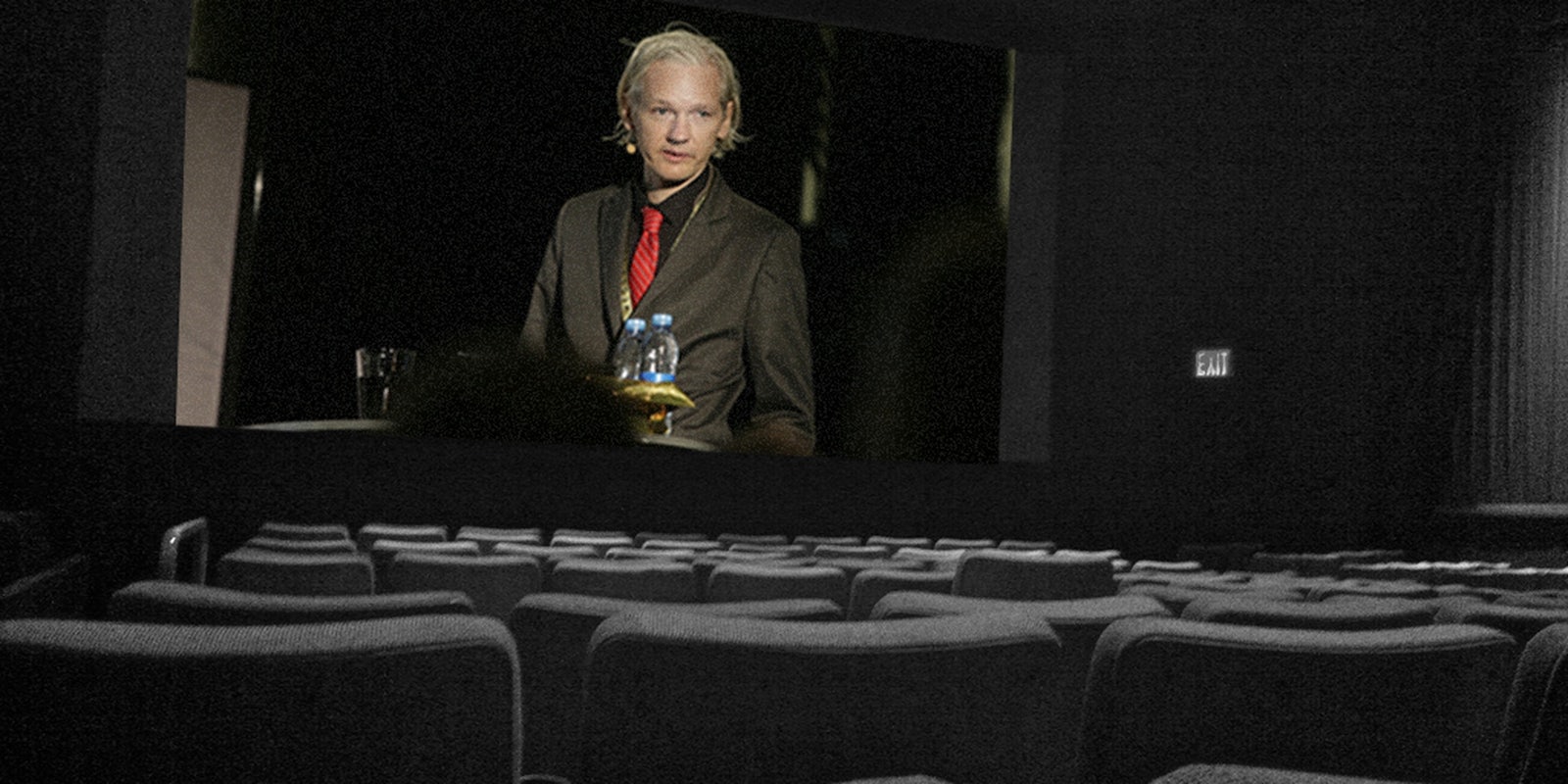By now, you’ve probably seen an advertisement for The Fifth Estate, the Hollywood version of the saga of whistleblower organization WikiLeaks and its founder, Julian Assange. The trailer is suspenseful, carried by dramatic music and inspirational quotes, depicting a world of fast-paced journalism in the face of certain danger. At any moment, you expect Jason Bourne to leap from a helicopter and crash through a glass ceiling, guns blazing.
But in spite of all of the attention The Fifth Estate has brought WikiLeaks, they’d prefer you skip it.
As WikiLeaks was never consulted about the Dreamworks/Disney film on us, we’ve given our advice for free: It’s bad https://t.co/B5jqrwqD8U
— WikiLeaks (@wikileaks) September 19, 2013
This weekend, instead of wasting your time and money on Hollywood propaganda, why not watch #MEDIASTAN instead? https://t.co/x4bWa7cVoL
— WikiLeaks (@wikileaks) October 11, 2013
Is the Fifth Estate trying to become the new Zero Dark Thirty?
— WikiLeaks (@wikileaks) September 19, 2013
Julian Assange has called The Fifth Estate a “mass propaganda attack” and issued a memo to that effect, bullet-pointing WikiLeaks’ complaints about the script—which the organization obtained and released online. A WikiLeaks statement, attributed to Assange, called the film a “generic snoozefest that only the U.S. government could love,” and pointed to key players missing from the credits, such as Sarah Harrison, a WikiLeaks journalist who this year accompanied whistleblower Edward Snowden on his flight from to Moscow.
To challenge The Fifth Estate’s version of events, WikiLeaks produced its own film, Mediastan, a documentary that follows five young journalists attempting to publish classified U.S. documents during the height of Cablegate.
The majority of the footage was shot in Central Asian countries, including Tajikistan, Kazakhstan, and Kyrgystan, with brief takes in England and New York City. The film is directed and narrated by Johannes Wahlström, with a producer credit going to Assange himself.
The Fifth Estate will likely entertain an audience with no foreknowledge of WikiLeaks, Julian Assange, or the impact of their work. In comparison, the climax of Mediastan involves (spoiler alert!) a flat tire on a third-world dirt road that looks like it was last travelled by Silk Road traders in the First Century A.D. While everything in the film is part of the WikiLeaks saga, because it actually happened, the story is forced to stand on its own, with few background details provided to contextualize events for newcomers.
In other words, Mediastan isn’t exactly a film about the origins of WikiLeaks; it’s more of an expansion pack for people already aware of the group’s significance.
The documentary profiles the journey of the five WikiLeakers as they trek through Central Asia, attempting to meet with foreign news agencies and offer them classified U.S. documents. After the troupe hits a few of their destinations, however, a pattern of failure begins to emerge. Despite the newsworthiness of the documents, and their unique relevance to the individual states visited, no one seems willing to step up and publish them.
While the journos are in Turkmenistan—before they get deported—they’re told there’s simply no demand for investigative journalism in the country. The editor-in-chief of the paper, Neutral Turkmenistan, openly admits that he’s “not a journalist” and that he’s been appointed to his job by the nation’s President. Of course, this isn’t particularly surprising. Turkmenistan ranks among the bottom three countries in the world on Reporters Without Borders’ Press Freedom Index. In fact, most of the counties the journalists visit have state-owned and operated news agencies.
Two additional interviews are featured near the end of the film. The first is with Alan Rusbridger, Editor-in-Chief of the Guardian, and the second with Bill Killer, former Executive Editor of The New York Times. In both interviews, the editors discuss how the U.S. government involved itself (or how the newspapers involved the U.S. government) in the publication of the WikiLeaks documents. And apparently, Bill Keller was unaware that he was being filmed at the time.
As any journalist is likely to tell you, newsgathering isn’t usually as dramatic as Hollywood portrays it. Rarely will you find yourself trying to lose a tail, making high-speed turns down narrow city streets, or having to run and duck from an assassin’s bullet.
Sometimes, you’re just crammed into a crappy little car with four other people, in a third world country, pitching an important story that no one wants to publish.
Photos by Sackerman519/Flickr and newmediadaysdk/Flickr (Remix by Fernando Alfonso III)


